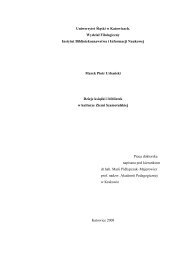Sonorant conspiracy131It should be clarified here that the representation of the agentive suffix –erin (24) is not complete. The low schwa [Œ] of the suffix results from thevocalisation of /R/ in the word-final position. It is perfectly logical to ascribea greater potential to full vowels than to empty ones (Cyran 2003). Itmeans that the suffix vowel in [vA†knŒ], unlike the empty one in [vA†g®N],has the ability to both govern and license. Now the reason why the schwain (24) disappears is the fact that it is governed by the suffix vowel. Moreover,the latter vowel licenses the preceding nasal. In this situation thenasal escapes the negative influence of the government while being licensedat the same time. As the latter context describes a strong positionit explains the fact why the nasal does not search for the place to spread,hence the lack of both homorganicity and syllabicity in (24). Furthermore,note that the schwa in (23) and (24) is suppressed for two different reasons.In (23) it is displaced by the spreading nasal, while in (24) it isgoverned by the following suffix vowel. Finally, the reason why the obstruentsin suffixed forms undergo devoicing again boils down to the presenceof the suffix vowel or, to be precise, to the presence of the governed emptynucleus following the obstruent. In traditional accounts of German finaldevoicing the phenomenon is claimed to take place in the coda position(Rubach 1990, Hall 1992, W iese 1996). In Brockhaus’s (1995)account obstruent devoicing appears before an empty nuclear position. TheStrict CV model combines both proposals because the traditional coda isdescribed here as the position before a governed empty nucleus. Furthermore,this solution provides a ready answer to the absence of obstruentdevoicing before syllabic consonants and additionally confirms the leftwardspreading of the structures in question. In short, in the latter situation thenuclear position after the obstruent is not empty, but is occupied by thefollowing sonorant. Note that by claiming that devoicing appears beforegoverned empty nucleus we can rule out the representation under (20a)above. Were it correct, we would observe obstruent devoicing in all theforms under (19), which is, however, not the case there. Finally, the solutionproposed by Scheer (2003) explains why syllabic consonants ariseonly after a schwa and why they are so common word-finally. As for theformer, it is a widely accepted fact that the schwa is the next but last stepon the lenition trajectory from a full vowel to zero. It follows that a fullvowel, unlike a schwa, is not weak enough to be displaced by the sonorant.The reason why they appear so readily at the right margin is the fact thatthis is a weak position. Concluding, Scheer (2003) predicts three differentreactions of sonorants to the positional weakness. Thus, in order togain stability the sonorant may spread to a neighbour to share the placeelement. Secondly, it may spread to the preceding nucleus displacing schwa9*
132 Bogus clusters, syllabic consonants and vowel syncope. . .and taking over its duties. Finally, the sonorant is not able to spread toa neighbouring position and hence faces decomposition or lenition, losingmanner or place elements.4.3. English syllabic consonants4.3.1. IntroductionIn this section we focus our discussion on syllabic consonants in English.We introduced the basic facts and pinpointed some problems concerningthe appearance of syllabic consonants in the language in section2.1 above. In what follows we shall address the questions raisedin that section and offer a unified solution to the phenomenon in question.It will be pointed out that syllabic consonants arise in response to a positionalweakness as predicted by Scheer (2003). Since, however, syllabicconsonants are possible not only before empty nuclei but also before realisedvowels, it will be claimed that syllabic consonants appear in the intervocalicposition, that is, after schwa and before a nucleus, be it empty orrealised. As the discussion unfolds, it will become evident that lexically presentnuclei are never properly governed and vowel syncope is always theresult of the expansionist behaviour of sonorants.4.3.2. In search of a unified context for syllabic consonantsThe preceding section has been devoted to German homorganic clustersof the obstruent plus nasal type, with some reference to English nasalplus obstruent clusters. Since partial geminates, especially those appearingin progressive nasal assimilation, are intimately connected with syllabicconsonants, the latter phenomenon has also been discussed. Havingintroduced Scheer’s (2003) proposal to explain partial geminates inGerman, we are in a position to address the questions raised at the endof section 2.1 above. Namely, what is the precise context and the trigger
- Page 2 and 3:
Polish and EnglishConsonantal Clust
- Page 4 and 5:
Artur KijakPolish and EnglishConson
- Page 6 and 7:
ContentsPreface . . . . . . . . . .
- Page 8 and 9:
PrefaceThe phonotactic peculiaritie
- Page 10 and 11:
Preface92000), Ploch (1999), van de
- Page 12:
List of abbreviationsBrODIdim.FODge
- Page 15 and 16:
14 The frameworkemploying the simpl
- Page 17 and 18:
16 The frameworksion in section 3 b
- Page 19 and 20:
18 The frameworkmodel is able to ha
- Page 21 and 22:
20 The frameworkhanan 1986). Thus,
- Page 23 and 24:
22 The frameworkare not derived at
- Page 25 and 26:
24 The frameworkWhat is interesting
- Page 27 and 28:
26 The frameworklateral relations,
- Page 29 and 30:
28 The frameworkIn general, we can
- Page 31 and 32:
30 The frameworkobstruents followed
- Page 33 and 34:
32 The frameworkLet us look more de
- Page 35 and 36:
34 The framework(7) PGO N O N O N O
- Page 37 and 38:
36 The frameworkby all sounds. Thus
- Page 39 and 40:
38 The frameworkexist. What is a Br
- Page 41 and 42:
40The frameworkLowenstamm’s (1999
- Page 43 and 44:
42 The frameworksky and Halle’s (
- Page 45 and 46:
44 The phonological nature of the b
- Page 47 and 48:
46 The phonological nature of the b
- Page 49 and 50:
48 The phonological nature of the b
- Page 51 and 52:
50 The phonological nature of the b
- Page 53 and 54:
52 The phonological nature of the b
- Page 55 and 56:
54 The phonological nature of the b
- Page 57 and 58:
56 The phonological nature of the b
- Page 59 and 60:
58 The phonological nature of the b
- Page 61 and 62:
60 The phonological nature of the b
- Page 63 and 64:
62 The phonological nature of the b
- Page 65 and 66:
64 The phonological nature of the b
- Page 67 and 68:
66 The phonological nature of the b
- Page 69 and 70:
68 The phonological nature of the b
- Page 71 and 72:
70 The phonological nature of the b
- Page 73 and 74:
72 The phonological nature of the b
- Page 75 and 76:
74 The phonological nature of the b
- Page 77 and 78:
76 The phonological nature of the b
- Page 79 and 80:
78 The phonological nature of the b
- Page 81 and 82: 80 The phonological nature of the b
- Page 83 and 84: 82 The phonological nature of the b
- Page 85 and 86: 84 The phonological nature of the b
- Page 87 and 88: 86 The phonological nature of the b
- Page 89 and 90: 88 The phonological nature of the b
- Page 91 and 92: 90 The phonological nature of the b
- Page 93 and 94: 92 The phonological nature of the b
- Page 95 and 96: 94 The phonological nature of the b
- Page 97 and 98: 96 The phonological nature of the b
- Page 99 and 100: 98 The phonological nature of the b
- Page 101 and 102: III. Bogus clusters, syllabic conso
- Page 103 and 104: 102 Bogus clusters, syllabic conson
- Page 105 and 106: 104 Bogus clusters, syllabic conson
- Page 107 and 108: 106 Bogus clusters, syllabic conson
- Page 109 and 110: 108 Bogus clusters, syllabic conson
- Page 111 and 112: 110 Bogus clusters, syllabic conson
- Page 113 and 114: 112 Bogus clusters, syllabic conson
- Page 115 and 116: 114 Bogus clusters, syllabic conson
- Page 117 and 118: 116 Bogus clusters, syllabic conson
- Page 119 and 120: 118 Bogus clusters, syllabic conson
- Page 121 and 122: 120 Bogus clusters, syllabic conson
- Page 123 and 124: 122 Bogus clusters, syllabic conson
- Page 125 and 126: 124 Bogus clusters, syllabic conson
- Page 127 and 128: 126 Bogus clusters, syllabic conson
- Page 129 and 130: 128 Bogus clusters, syllabic conson
- Page 131: 130 Bogus clusters, syllabic conson
- Page 135 and 136: 134 Bogus clusters, syllabic conson
- Page 137 and 138: 136 Bogus clusters, syllabic conson
- Page 139 and 140: 138 Bogus clusters, syllabic conson
- Page 141 and 142: 140 Bogus clusters, syllabic conson
- Page 143 and 144: 142 Bogus clusters, syllabic conson
- Page 145 and 146: 144 Bogus clusters, syllabic conson
- Page 147 and 148: 146 Bogus clusters, syllabic conson
- Page 149 and 150: 148 Bogus clusters, syllabic conson
- Page 151 and 152: 150 Bogus clusters, syllabic conson
- Page 153 and 154: 152 Conclusionnisms available in th
- Page 155 and 156: 154 ReferencesBotma, B. (2004) Phon
- Page 157 and 158: 156 ReferencesGussmann, E. (1998) D
- Page 159 and 160: 158 ReferencesPawelec, P. (1989) Cy
- Page 161 and 162: 160 ReferencesScheer, T. (1997) Vow
- Page 164 and 165: Author indexAbercrombie, David 103A
- Page 166 and 167: Artur KijakGrupy spó³g³oskowe w
- Page 168 and 169: Zusammenfassung167für alle anderen
















